Granicus
After the victory at Granicus' river, Alexander gave all the treasures to his soldiers
and his relatives. Pardiccas asked him: "What do you leave for yourself?". He answered:"Hope".
The Persian satraps: Mithridatis of Cilicia, Spithridatis of Lydia, Arsites of Phrygia, Farnakis and others
had assembled at Zelea, near Dascylium, capital of Phrygia. Memnon of Rhodes, a Greek mercenary advised them to
avoid battle, to burn all crops, to destroy the wells so Alexander, who was short of supplies, would be forced to return back.
The Persian navy should attack to Macedonia. This was probably a good plan but the proud satraps wouldn't like to see their
lands burnt so they rejected the idea and proposed to face the enemy. (The sqopians allege that Greeks fought on the
persian side and so they were enemies of the Macedonian king. During greek history we have met many traitors who fought
against their own compatriots. Efialtis betrayed Spartans at Thaermopylae, Greeks exislamized (Jenissaries)
conquered Constantinople for Mehmet,
Barbarossa the pirate was also Greek who conquered all Aegean islands for the sultan,
during
Greek revolution Greeks of Nenekos,
fought on the side of Ibrahim pasha against the revolutionaries etc.)
Alexandros reached the western side of Granicus River which flow into the
Sea of Marmara or Propontis (May 334).
His important commanders were Perdiccas, Craterus, Amyntas, Callas, Cleitus Melanas, Meleagros,
Antigonus, Selephcus, and Parmenio's son Philotas.
Before the dawn, the Greek army entered the water to cross the river. Hetairoi
(under Ptolemeos and Amyntas) were the
first to meet the enemy and they suffered heavy casualties. Alexander and Parmenion followed and managed to reach
the other bank of the river. The battle was uncertain, but Alexandros knew from
Xenophon's sources that if Persians loose their
leader they loose also their courage. Fearless, he attacked to their commanders. His spear was broken and he asked another
from Aretos, but Aretos' spear was broken too, and he was given a spear from
Demaratos of Corinth. Alexandros
charged against Mithridatis killing him and was hit on his head by Roisakis. The Greek king killed also Roisakis and
at that moment Spithridatis raised his hand with his sword. It was Cleitus who cut Spithridatis' arm and saved Alexander's life.
When the Persians saw their leaders killed, they retreated. The Macedonian king was merciless to the Greek mercenaries
and he massacred most of them. Two thousands of them who survived, were sent to the mines of Pangeum to work as slaves,
because
they Greeks had fought against Greeks.
After the battle he sent to Athens 300 persian armors with the epigram
"Alexander the son of Philip, and the Hellenes, except the Lacedaemonians (Spartans), won these from the barbarians who
inhabit Asia."(Arrianos)
Twenty five Hetairoi were killed and Lysippos, the sculptor, was ordered from the young emperor to make their statues
in Macedonia.
Diodorus of Sicily, writes that
"Alexander liberated all Greek cities
(Ellinidas poleis) from Persian yoke and made them autonomous and tax-free.
Miletus, homeland of Thales and Anaximandros, decided to surrender, but when
the enormous Persian fleet (400 ships) entered the port, the garrison closed the gates. The young Macedonian assembled his
machines and started the siege. The Greek fleet, under the command of Nearhos,
after passing the Mycale's cape didn't
venture a naval battle against the superior enemy fleet. The ships were drawn to the shore and Alexander decided that he
would continue the war without them. According to the legend an eagle came on a ship when it was on the beach and
that was considered a good sign. Miletus fell, Alexandros had given strict orders nobody to be harmed. Some soldiers took
refuge to the small island of Lade, only to surrender later. Finally they enlisted to Alexander's army.
The Hellene Autocrator had a meeting with an old lady with the name Ada. She was daughter of Mausulus and gueen of Caria.
She adopted Alexandros and she was appointed as satrap of Caria.
Alexander moved south to take control of Lycia and Pamphylia, and liberated Xanthos and Aspendos.
The persian fleet was cut from its harbours and became useless, especially after Memnon's death. According to to
historian Callisthenes of Olynthus, there was a path at Perga, along the coastline that was difficult to pass. But when the Greek army
arrived, the sea receded and the young king passed without difficulty. Those signs were used to encourage the soldiers
and to have confidence to their king. Then Alexandros turned north to Phrygia, to meet the other half of his army, which
was under Parmenio's orders. They met in April 333 at Gordium, the capital of Phrygia,
which lies west of the city of Ancyra.
There was a chariot of the Phrygian king Midas. According to the tradition whoever loosened the knot binding the yoke,
would be the master of all Asia. The Macedonian king tried to loosen the complicated knot but after a while he pulled his sword
and cut the Gordian knot.
From Gordium he moved south through Cappadocia and passed the Cilician Gates (a rough passage through Taurus mountain chain)
which the persians had left unguarded. He arrived just in time to prevent the Persian satrap Arsames from destroying the
capital of Cilicia, Tarsus which was an Argean colony. He stayed at Tarsus and one morning
he swam in the frozen waters of Kydnos' river. He became seriously ill. The high fever almost killed him and it was
Philip the Acarnanian, his personal doctor who saved his life.
In the meantime, the Great king had gathered hundreds of thousands fighters (Plutarch of Chaeronea writes that his army
counted 600,000 men) from all places of his vast empire. 20000 of them were Greek
mercenaries. Darius' treasures were transported by 400 camels and he had with him also his family. When the Athenian
Haridimos was asked by Darius about his opinion, the Greek traitor told him that the asian crowd didn't have many chances to
win Alexander's army. Darius touched the Athenian on his belt and that meant that he was to be executed.
The spy network of the Greek emperor didn't work. So Darius
from the north, passed through Amanician Gates of Mt.Amanus in northern Syria, and stealthily camped behind Alexandros
who had encamped at the port of Myriandrus (Alexandretta).
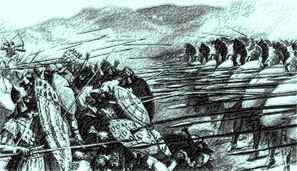 Persians camped to the eastern side of Granicus, near the city Adrasteia.
Persians camped to the eastern side of Granicus, near the city Adrasteia.
Ephessus, Miletus, Halicarnassus
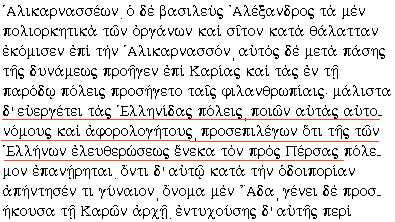 After Granicus, Alexander moved south and reached Sardeis, capital of Lydia, the land of Kroissus.
Persian Mithrinis, surrendered the city and the garrison was replaced by Argeans soldiers under Pausanias.
There he rededicated the temple of Zeus, which the Persians had used to sacrifice to their supreme god Ahuramazda,
spreading so the greek religion to the barbarians.
Aeolian and Ionian cities opened their gates. The tyrants were expelled and democracies were installed. Alexander again
underlined his Panhellenic cause. Smyrna (homeland of Homer), Priene, Ephessus were liberated
and the crowds hailed on the streets: "Alexandre, Alexandre!".
In Ephessus, Alexander made offers to goddess Artemis and gave orders to reconstruct the Temple of Artemis
(one of the seven wonders)
After Granicus, Alexander moved south and reached Sardeis, capital of Lydia, the land of Kroissus.
Persian Mithrinis, surrendered the city and the garrison was replaced by Argeans soldiers under Pausanias.
There he rededicated the temple of Zeus, which the Persians had used to sacrifice to their supreme god Ahuramazda,
spreading so the greek religion to the barbarians.
Aeolian and Ionian cities opened their gates. The tyrants were expelled and democracies were installed. Alexander again
underlined his Panhellenic cause. Smyrna (homeland of Homer), Priene, Ephessus were liberated
and the crowds hailed on the streets: "Alexandre, Alexandre!".
In Ephessus, Alexander made offers to goddess Artemis and gave orders to reconstruct the Temple of Artemis
(one of the seven wonders)
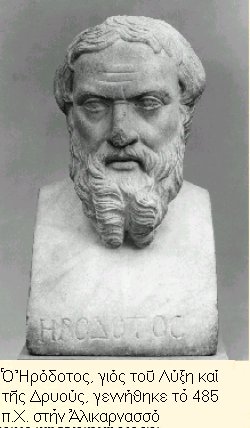 Tralleis (homeland of Anthemius, architect of Aghia Sophia) and Mylasa opened the gates to
Ptolemeos, but Halicarnassus homeland of Herodotus (father of History)
resisted strongly. The walls of Halicarnassus were exceptionally strong and the leader of the resistance was Memnon of Rhodes,
the most dangerous enemy. He was appointed by Darius as supreme commander of all Mikra Asia, and his wife Varsine with his
two young boys were taken as hostages to Susa, by the Persian king.
Halicarnassus
was difficult to fall. Greeks had heavy casualties and Alexander was forced to the extremity of having to send a herald to
ask for the bodies. The persian fleet was anchored to her harbor and provided the defenders with provisions. One night
Perdiccas, drunk tried to assault the city but his men were almost slaughtered.
Another night, Memnon used Macedonians to infiltrate to the aggressor's lines and they burnt the siege towers.
Eventually, Halicarnassus was taken by an assault in the northern part of the city, but Memnon and the Persian garrison
sailed away. Memnon planned to conquer Aegean islands, invade mainland Greece and cut Alexander's contact with home,
but unexpectedly died in unexplained conditions. The Persian navy stayed inactive and Alexandros was free to continue his
campaign.
Tralleis (homeland of Anthemius, architect of Aghia Sophia) and Mylasa opened the gates to
Ptolemeos, but Halicarnassus homeland of Herodotus (father of History)
resisted strongly. The walls of Halicarnassus were exceptionally strong and the leader of the resistance was Memnon of Rhodes,
the most dangerous enemy. He was appointed by Darius as supreme commander of all Mikra Asia, and his wife Varsine with his
two young boys were taken as hostages to Susa, by the Persian king.
Halicarnassus
was difficult to fall. Greeks had heavy casualties and Alexander was forced to the extremity of having to send a herald to
ask for the bodies. The persian fleet was anchored to her harbor and provided the defenders with provisions. One night
Perdiccas, drunk tried to assault the city but his men were almost slaughtered.
Another night, Memnon used Macedonians to infiltrate to the aggressor's lines and they burnt the siege towers.
Eventually, Halicarnassus was taken by an assault in the northern part of the city, but Memnon and the Persian garrison
sailed away. Memnon planned to conquer Aegean islands, invade mainland Greece and cut Alexander's contact with home,
but unexpectedly died in unexplained conditions. The Persian navy stayed inactive and Alexandros was free to continue his
campaign.
Gordian knot
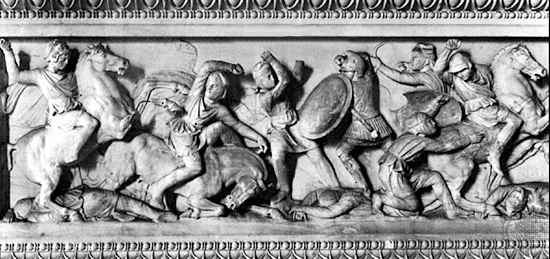

 ||1.|-|2.|-|3.|-|
4.|-|5.|-|6.|-|
7.||
||1.|-|2.|-|3.|-|
4.|-|5.|-|6.|-|
7.||
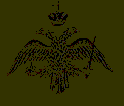 _____
_____




